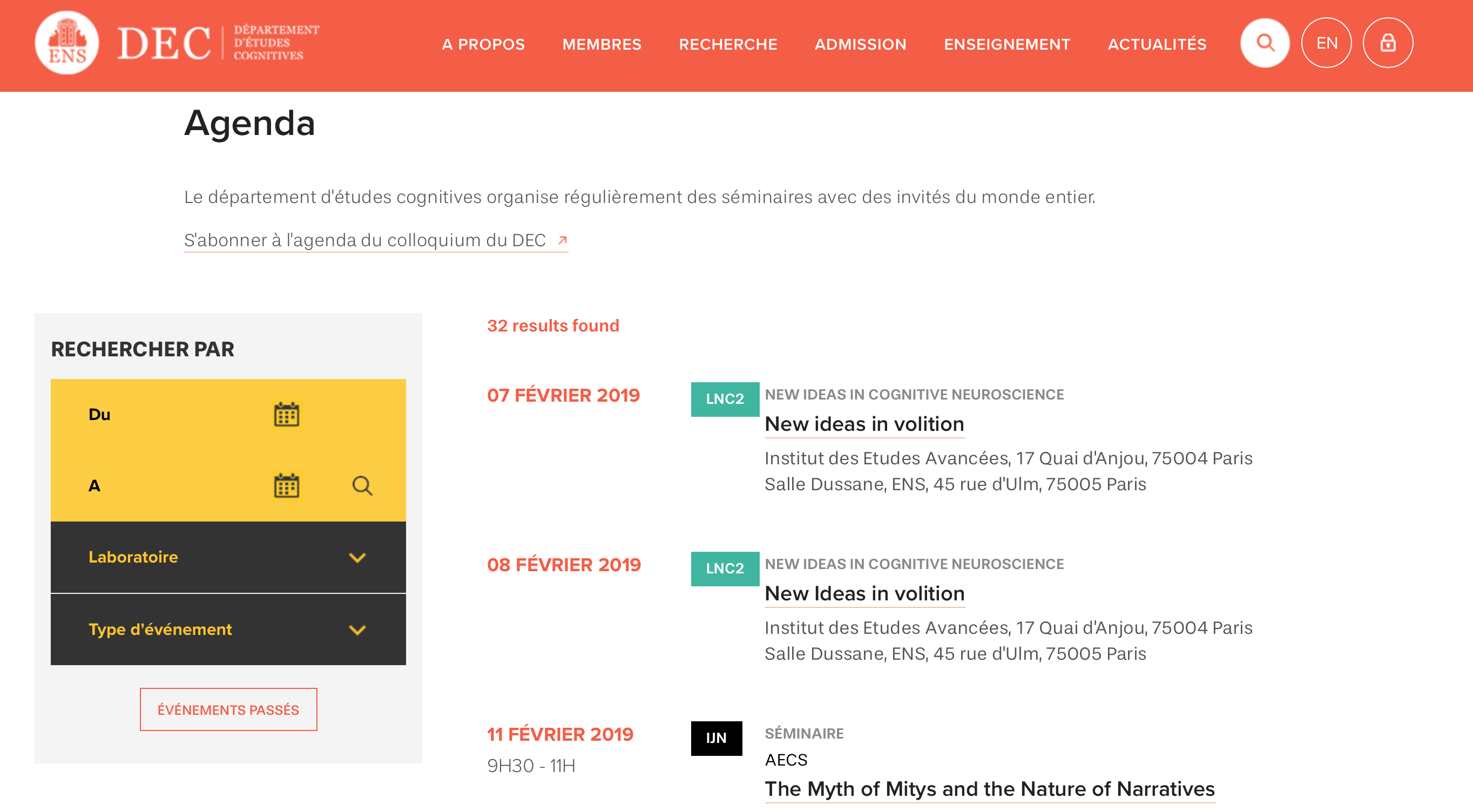A LA UNE
Conférences Legrain 2019 - Le dérèglement climatique : défi mondial, approches sociales
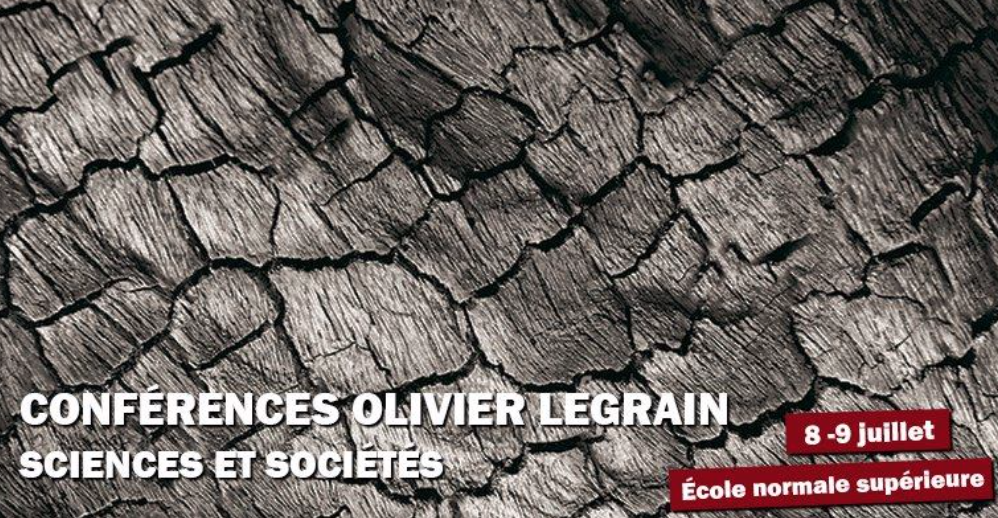 Les Conférences Olivier Legrain Sciences et Société sont un rendez-vous annuel ayant pour objet de mettre en lumière
des enjeux scientifiques et des résultats obtenus dans le cadre de recherches innovantes, actuellement en cours, et dont
les implications pourraient bien bouleverser nos sociétés contemporaines.
Les Conférences Olivier Legrain Sciences et Société sont un rendez-vous annuel ayant pour objet de mettre en lumière
des enjeux scientifiques et des résultats obtenus dans le cadre de recherches innovantes, actuellement en cours, et dont
les implications pourraient bien bouleverser nos sociétés contemporaines.
Après une première édition consacrée à l’ingénierie du génome en 2017, et une deuxième édition aux rapports entre intelligence artificielle et cognition en 2018, l’édition 2019 qui aura lieu les 8 et 9 juillet à l'ENS sera consacrée à la question du dérèglement climatique dans une perspective transdisciplinaire, des sciences du vivant et du climat aux sciences humaines et sociales.
Coralie Chevallier, chercheuse en sciences cognitives au DEC (équipe Evolution and Social Cognition) étudie les facteurs cognitifs et évolutionnaires qui influencent les comportements sociaux.
Elle viendra parler du changement climatique et des barrières cognitives.
 L' Agence Française de Développement (AFD), AOC media, et Reporterre sont partenaires des conférences Legrain 2019.
L' Agence Française de Développement (AFD), AOC media, et Reporterre sont partenaires des conférences Legrain 2019.
Un entretien avec Coralie Chevallier a été publié sur le site de Reporterre le 3 juillet.
Lire l'entretien
Consulter le programme des Conférences Legrain
PRIX
Mariana Babo-Rebelo (LNC2) a reçu le prix de Thèse PSL|Adeli
L’université PSL et ADELI (Association pour le Développement de la Logique Informatique) ont créé ensemble un prix de thèse "Sciences des Données, Intelligence Artificielle et interfaces"
Mariana Babo-Rebelo est lauréate du prix 2019, pour sa thèse intitulée "Anchoring the self in the neural monitoring of visceral signals: how heartbeat-evoked responses encode the self", soutenue en mars 2017.
La remise du prix aura lieu fin novembre 2019.
Prix de Thèse PSL SHS 2019 : mention spéciale pour Anna Giustina (Institut Jean Nicod)
Le 13 mai dernier le jury du Prix de Thèse SHS PSL a récompensé cinq travaux doctoraux d’excellence en Arts, Esthétique, Littérature – Droit, Economie, Gestion - Humanités - Interfaces Sciences/Humanités - Sciences Sociales.
Anna Giustina (IJN) a obtenu une mention spéciale du jury dans la catégorie "Humanités" pour sa thèse "Primitive Introspection" soutenue à l'ENS en décembre 2018.
La remise des prix s’est tenue le 12 juin au Collège de France lors d’une cérémonie solennelle.
Voir le site de PSL
MEDIAS
François Recanati, l'esprit du langage
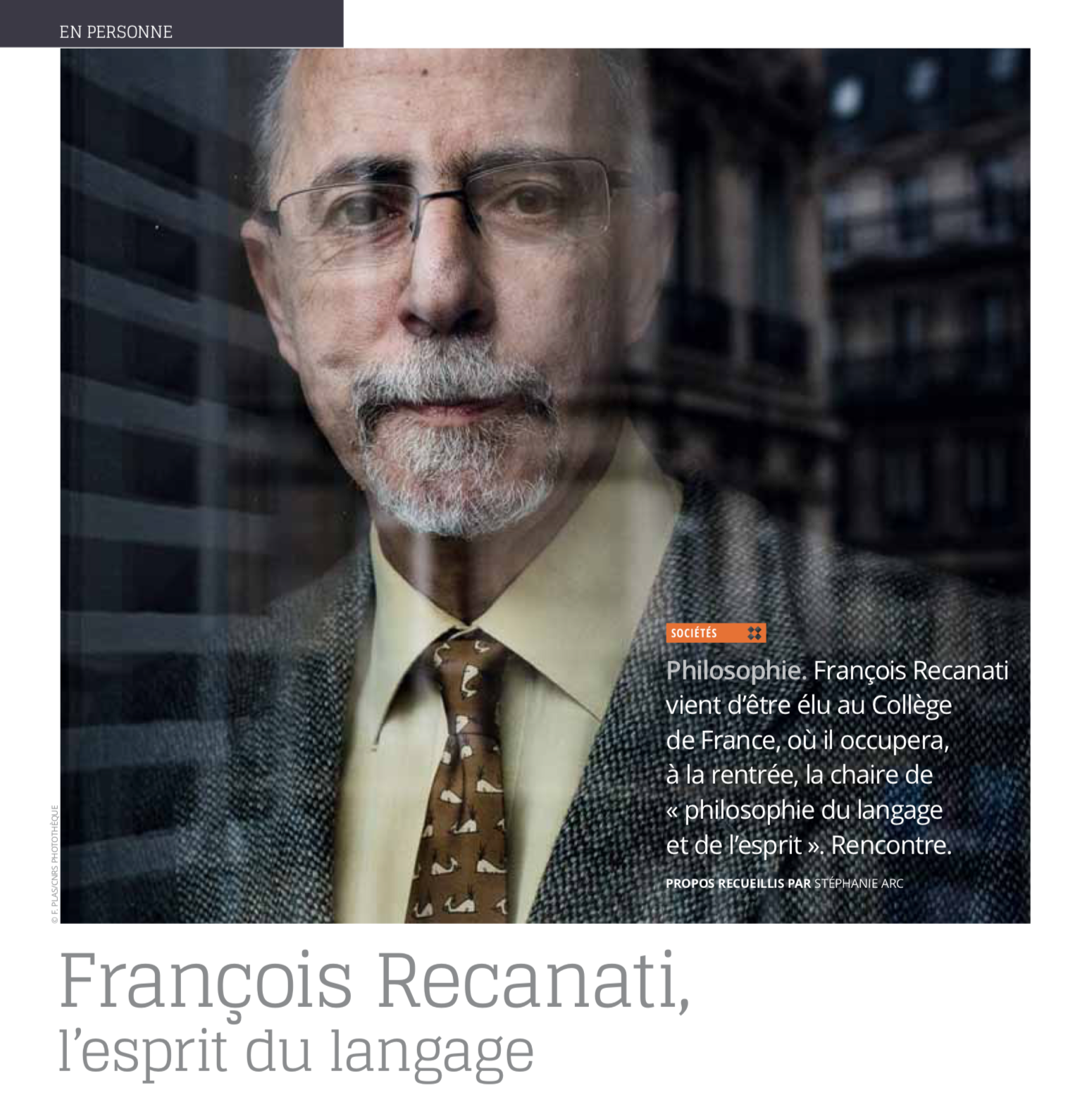 François Recanati, a été élu au Collège de France, où il occupera à la rentrée la chaire de "philosophie du langage et de l'esprit".
Entretien dans le numéro Hiver 2019 du "CNRS Le Journal".
François Recanati, a été élu au Collège de France, où il occupera à la rentrée la chaire de "philosophie du langage et de l'esprit".
Entretien dans le numéro Hiver 2019 du "CNRS Le Journal".
Lire l'entretien pages 10 et 11
PARUTION
Le cerveau en lumières
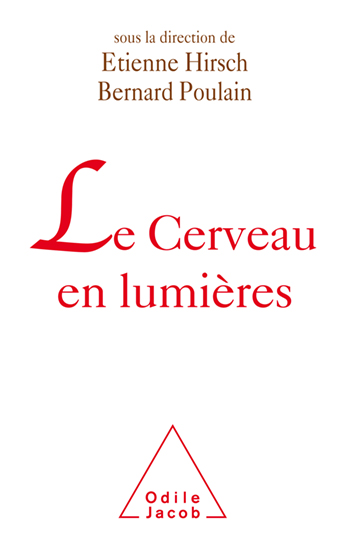 Etienne Koechlin et Catherine Tallon-Baudry (2019) ont contribué au livre "Le Cerveau en lumière" édité par Etienne Hirsch et de Bernard Poulain et paru chez Odile Jacob à travers la rédaction de chapitres.
Etienne Koechlin et Catherine Tallon-Baudry (2019) ont contribué au livre "Le Cerveau en lumière" édité par Etienne Hirsch et de Bernard Poulain et paru chez Odile Jacob à travers la rédaction de chapitres.
Dans ce livre, une trentaine de spécialistes décrivent l’état des connaissances actuelles ainsi que les questions ouvertes en neurosciences et leurs applications.
VIDEO
Prix Jean Nicod 2019 : conférence de Martine Nida-Rümelin
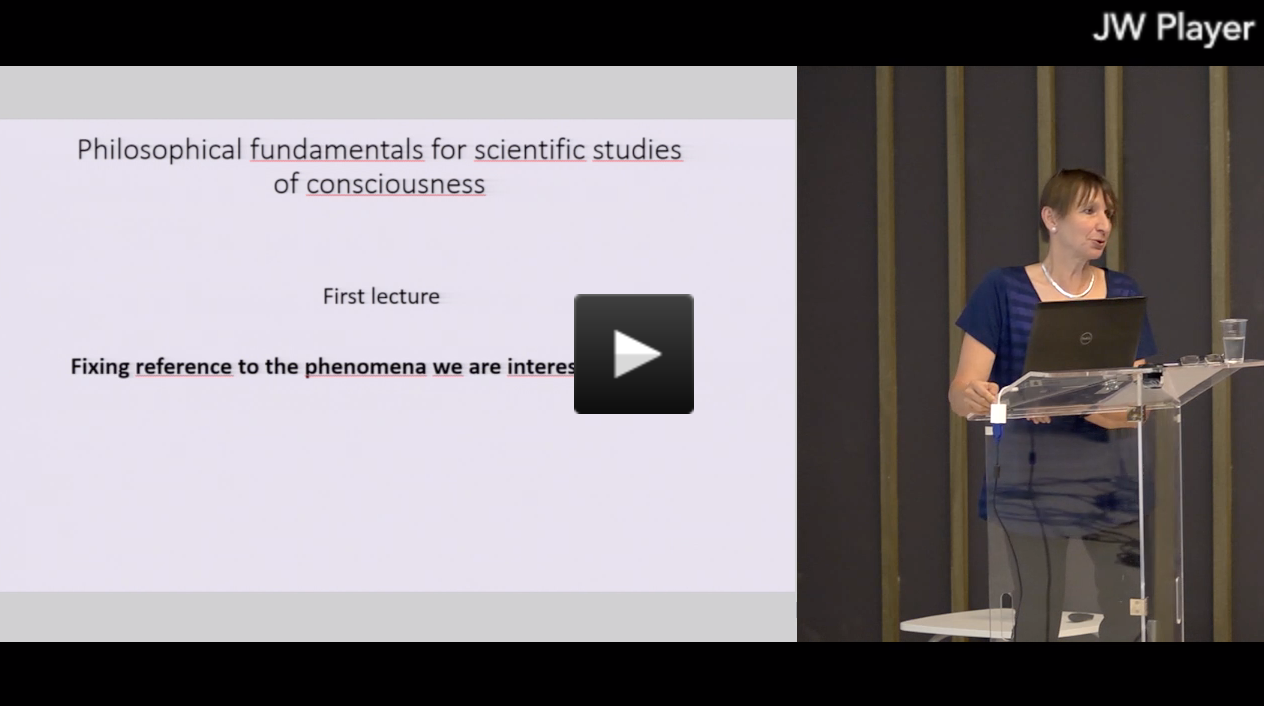 Le Prix Jean Nicod a été décerné cette année à Martine Nida-Rümelin (Université de Fribourg).
Le Prix Jean Nicod a été décerné cette année à Martine Nida-Rümelin (Université de Fribourg).
Sa conférence donnée le 10 mai dernier à l'ENS, intitulée "Fixing reference to the phenomena we are interested in", a été filmée et est désormais visible
sur le site SavoirsENS.
Voir la vidéo
En savoir plus sur le Prix Jean Nicod
QUELQUES PUBLICATIONS RECENTES
Ariane Bigenwald and Valerian Chambon (2019),
Criminal Responsibility and Neuroscience: No Revolution Yet, Frontiers in Psychology, 10, 1406, 10.3389/fpsyg.2019.01406
Résumé :
Since the 90’s, neurolaw is on the rise. At the heart of heated debates lies the recurrent theme of a neuro-revolution of criminal responsibility. However, caution should be observed: the alleged foundations of criminal responsibility (amongst which free will) are often inaccurate and the relative imperviousness of its real foundations to scientific facts often underestimated. Neuroscientific findings may impact on social institutions, but only insofar as they also engage in a political justification of the changes being called for, convince populations, and take into consideration the ensuing consequences. Moreover, the many limits of neuroscientific tools call for increased vigilance when, if ever, using neuroscientific evidence in a courtroom. In this article, we aim at setting the basis for future sound debates on the contribution of neuroscience to criminal law, and in particular to the assessment of criminal responsibility. As such, we provide analytical tools to grasp the political and normative nature of criminal responsibility and review the current or projected use of neuroscience in the law, all the while bearing in mind the highly-publicized question: can neuroscience revolutionize criminal responsibility? Answering this question implicitly requires answering a second question: should neuroscience revolutionize the institution of criminal responsibility? Answering both, in turn, requires drawing the line between science and normativity, revolution and dialogue, fantasies and legitimate hopes
Guillaume Dezecache, Aude Bourgeois, Christophe Bazin, Philippe Schlenker, Emmanuel Chemla and Audrey Maille (2019), Orangutans’ Comprehension of Zoo Keepers’ Communicative Signals, Open Access
Animals, 9(6), 300; https://doi.org/10.3390/ani9060300
Résumé:
Zoological institutions often encourage cooperative interactions between keepers and animals so as to promote animals’
welfare. One useful technique has been conditioning training, whereby animals learn to respond to keepers’ requests,
which facilitates a number of, otherwise sensitive, daily routines. As various media have been used to convey keepers’
instructions, the question remains of which modality is best to promote mutual understanding. Here, we
explored this question with two captive female orangutans. In the first experiment, we compared orangutans’
understanding of previously acquired instructions when those were performed with verbal signals only, gazes only,
gestures only, and when all those modalities were combined. Our results showed that gestures were sufficient
for successful comprehension by these two apes. In the second experiment, we asked whether this preference could
be driven by the non-arbitrary relationship that gestures bear to what they refer to, through iconicity or pointing.
Our results revealed that neither iconicity nor pointing helped the subjects comprehend the keepers’ instructions.
Our results indicate a preference for instructions given through gestural signals in two captive female orangutans,
although its cause remains elusive. Future practice may encourage the use of gestures in communication between keepers
and orangutans in general or potentially other animals.
Fontanesi L, Palminteri S, Lebreton M. (2019), Decomposing the effects of context valence and feedback information on speed and accuracy during reinforcement learning: A meta-analytical approach using diffusion decision modeling.
Cogn Affect Behav Neurosci, 19(3):490-502. doi: 10.3758/s13415-019-00723-1.
Résumé :
Reinforcement learning (RL) models describe how humans and animals learn by trial-and-error to select actions
that maximize rewards and minimize punishments. Traditional RL models focus exclusively on choices, thereby
ignoring the interactions between choice preference and response time (RT), or how these interactions are
influenced by contextual factors. However, in the field of perceptual decision-making, such interactions have
proven to be important to dissociate between different underlying cognitive processes. Here, we investigated
such interactions to shed new light on overlooked differences between learning to seek rewards and learning
to avoid losses. We leveraged behavioral data from four RL experiments, which feature manipulations of two
factors: outcome valence (gains vs. losses) and feedback information (partial vs. complete feedback).
A Bayesian meta-analysis revealed that these contextual factors differently affect RTs and accuracy:
While valence only affects RTs, feedback information affects both RTs and accuracy. To dissociate
between the latent cognitive processes, we jointly fitted choices and RTs across all experiments
with a Bayesian, hierarchical diffusion decision model (DDM). We found that the feedback manipulation
affected drift rate, threshold, and non-decision time, suggesting that it was not a mere difficulty effect.
Moreover, valence affected non-decision time and threshold, suggesting a motor inhibition in punishing
contexts. To better understand the learning dynamics, we finally fitted a combination of RL and DDM (RLDDM).
We found that while the threshold was modulated by trial-specific decision conflict, the non-decision
time was modulated by the learned context valence. Overall, our results illustrate the benefits of jointly
modeling RTs and choice data during RL, to reveal subtle mechanistic differences underlying decisions
in different learning contexts.

